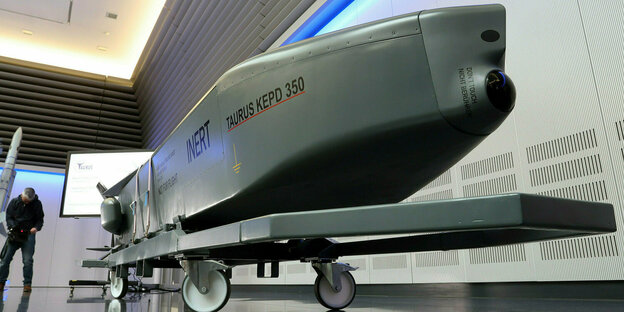In the digital age, hybrid warfare is part of the business. This is now also felt in the German army.

Taurus breakout made people sit up and listen Photo: Karl-Josef Hildenbrand/dpa
SEDAN taz | With the Taurus leak, it became clear that the Bundeswehr apparently has deficits in digital security. A change was heard through the WebEx service provider, from the Russian side. Although the conversation between Bundeswehr leaders revealed little that was sensitive, the mere fact that jokes about the Taurus cruise missile could leak made people's ears perk up. As expected, the leak, the Taurus and the soldiers' carelessness dominated the political debate.
Espionage, the interception of messages and attacks on digital systems are part of what happens on the battlefield, which is no longer limited to geographical territories but also takes place on the Internet. In digital times, mechanisms are needed to combat hybrid warfare and, in the future, measures to retaliate against hacker attacks. The message seems to have reached the slow apparatus of the Bundeswehr. With the reform, Defense Minister Boris Pistorius (SPD) elevated the cyber and space information sector to the status of the fourth branch of the armed forces.
Attacks on critical infrastructure, network security and disinformation campaigns already received high priority in the National Security Strategy presented last summer. Now Pistorius wants to start implementing it. The Bundeswehr Cyber Security Center in Rheinbach is essential for this. Data within the army must be protected and the army must be able to react quickly if the Bundeswehr's information technology is attacked inside or outside the country or during operations. Digi experts also provide booby trap jammers, as an electronic reaction force when a fight breaks out.
Within the federal government, various authorities are responsible for cyber defense, in particular departments located within the Federal Ministry of the Interior. The Federal Information Security Office (BSI) is currently warning of a “increased volume of attacks” against political parties and actors. The reason: the super electoral year. Elections will be held in Europe in about eight weeks; In the summer and early autumn, local and state elections will be held in Thuringia, Brandenburg and Saxony. According to the BSI, so-called hack-and-leak attacks, in which non-public data or documents are stolen and then published, sometimes manipulated or falsified, are especially to be expected.
For the Federal Minister of the Interior, Nancy Faeser (SPD), these digital attacks are not only an attack against the people directly affected, but also aim to undermine confidence in democracy. Faeser also does not hesitate to specifically name the aggressor: the Russian regime. There is great concern that the extracted data will be used to deliberately falsify and disseminate information.